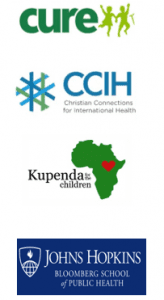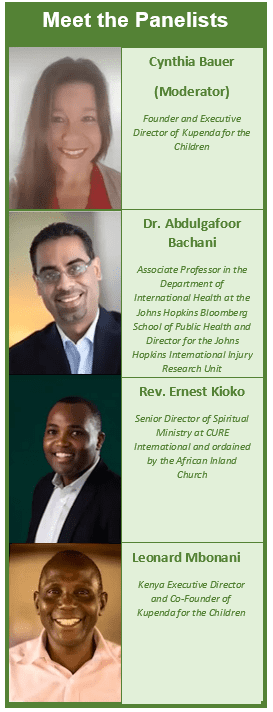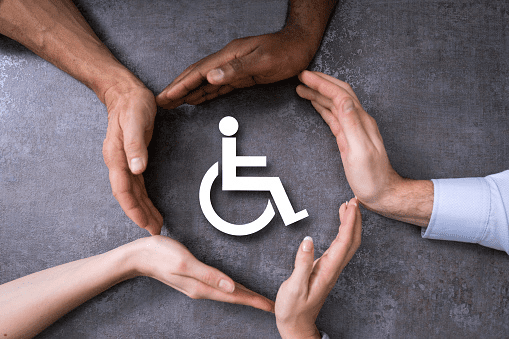Destigmatizing Disabilities in Faith Communities
by Lauren Blair
Posted on March 25, 2022
Beliefs, Child, disability, education, Health, International, marginalized, stigma, vulnerable
For the 1 in 7 people globally who are living with some type of disability, faith communities hold a tremendous influence on how they are treated by others. At times, this may include negative myths and misconceptions that can create obstacles to care and inclusion.
 This was the focus of a webinar on March 15, co-sponsored by Christian Connections for International Health (CCIH), Johns Hopkins Bloomberg School of Public Health, CURE International, and Kupenda for the Children. The webinar, entitled “Faith Actors Destigmatizing Disability to Improve Community-Based Rehabilitation,” included a presentation and panel discussion to address:
This was the focus of a webinar on March 15, co-sponsored by Christian Connections for International Health (CCIH), Johns Hopkins Bloomberg School of Public Health, CURE International, and Kupenda for the Children. The webinar, entitled “Faith Actors Destigmatizing Disability to Improve Community-Based Rehabilitation,” included a presentation and panel discussion to address:
- The definition of disability in various communities;
- The dominant belief systems/theological misconceptions regarding causes of and interventions for disability;
- Whether faith-driven solutions can, at times, become a barrier to the pursuit of medical care; and
- What can be done to partner with faith leaders, address stigmas, and promote inclusion.
According to panelist and Kupenda’s Kenyan Executive Director, Leonard Mbonani, communities treating people with disabilities negatively during their pursuit of healing or care is often an unfortunate reality in low-income settings. He illustrated this by stating,
“I have an experience of a child who went to the church with the hope that she was going to be healed through prayers. As much as the preacher tried to do the healing prayers, this did not happen. However, they ended up blaming the child and the parents for the child’s not getting healing…because their faith was very little….So in the long run, this child and the parents were told that ‘You cannot be in our church.’”
Managing Misconceptions
In response to such incidents, Mbonani described various solutions, including Kupenda’s 1-day Disability Training Workshops for community leaders. He stated,
“One thing we have built as an organization is to involve these same people who believe these misperceptions to be able to undo them, starting with pastors, traditional healers, and even government leaders.”
During these workshops, community leaders investigate causes of and interventions for disabilities through the lens of medical information, scripturally based teaching for pastors, and related laws and policies for government leaders. This is followed by a time for community leaders to develop action plans that will guide them in identifying and meeting the needs of people with disabilities in their own communities.
Rev. Ernest Kioko, panelist and Senior Director of Spirituality at CURE International, agreed. Over the past six months, Rev. Kioko has led CURE International’s initiative to adapt Kupenda’s Pastor Disability Training for their programs. He is now using this new curriculum to train more than 320 spiritual leaders in 16 countries as disability advocates.
He summarized,
“We are looking at it from an integrated point of view where we are healing—treating the disability through the hospitals but also championing the faith change so that people can see what the medical can do, but also what can God do through the proper understanding—medically, spiritually, and all that.”
Partners in Transformation
Dr. Abdulgafoor Bachani, panelist and Associate Professor at the Johns Hopkins Bloomberg School of Public Health, and Director for the Johns Hopkins International Injury Research Unit, elaborated about the goal for communities of people with disabilities. He stated,
“What we’re really aiming to do is here is enable people with certain activity limitations to be functioning and participating members of society.”
Mobilizing faith communities to be instigators of this positive change effectively promotes and confers value to individuals in a manner that can be easily replicated. Imagine the potential of communities transformed to treat those same 1 in 7 people with love, dignity, and the opportunity to share their gifts!
To hear the full panel discussion, click on the link below.
Want to keep updated on Kupenda’s work?
You can follow us on Facebook, Instagram, LinkedIn, and Twitter.
And please also sign up for our monthly newsletter here.
If you’re interested in supporting one of the many children we serve, head over to our sponsorship page to learn about how you can make a difference for just $30 / month.
You can also help children with disabilities stay safe and healthy during COVID-19 by donating here.




Leave a Reply